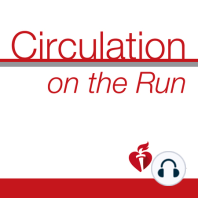17 min listen
Circulation July 6, 2021 Issue
ratings:
Length:
24 minutes
Released:
Jul 6, 2021
Format:
Podcast episode
Description
This week's show features a panel discussion between authors Adrian Wells and Hyeon Chang Kim as they discuss their articles "Improving the Effectiveness of Psychological Interventions for Depression and Anxiety in Cardiac Rehabilitation PATHWAY—A Single-Blind, Parallel, Randomized, Controlled Trial of Group Metacognitive Therapy" and "Associations of Ideal Cardiovascular Health and Its Change During Young Adulthood With Premature Cardiovascular Events: A Nationwide Cohort Study." Dr. Carolyn Lam: Welcome to Circulation on the Run, your weekly podcast summary and backstage pass to the journal and its editors. We're your co-hosts. I'm Dr. Carolyn Lam, Associate Editor from the National Heart Center and Duke National University of Singapore. Dr. Greg Hundley: And I'm Dr. Greg Hundley, also your co-host. And Associate Editor, Director of the Pauley Heart Center, VCU Health in Richmond, Virginia. Dr. Carolyn Lam: Greg, we're starting off the month with double features, and these are just so interesting. The first paper talks about psychological interventions for depression and anxiety in cardiac rehabilitation. And the next talks about ideal cardiovascular health and its change during young adulthood and how that relates to premature cardiovascular events. Cool, huh? Dr. Greg Hundley: Absolutely. Well, Carolyn. How about we grab a cup of coffee and start discussing some of the other articles in the issue? And I could go first. Carolyn, the first article that I've got is from Mrs. Elizabeth Jordan from Ohio State University Wexner Medical Center. And it really pertains to cardiomyopathies. And remember, Carolyn, classically, we categorize hypertrophic, dilated, and arrhythmogenic right ventricular cardiomyopathy. And each has a signature genetic theme. Hypertrophic cardiomyopathy and ARVC are largely understood as genetic diseases of sarcomere or desmosome proteins. But in contrast, there are over 250 genes spanning more than 10 gene ontologies that have been implicated in dilated cardiomyopathy. And therefore, it really represents a very complex and diverse genetic architecture. So to clarify this, a systematic curation of evidence to establish the relationship of genes with dilated cardiomyopathy was conducted by an international panel with clinical and scientific expertise in dilated cardiomyopathy genetics. And they evaluated evidence supporting monogenic relationships of genes with idiopathic dilated cardiomyopathy. Dr. Carolyn Lam: Oh, wow. That sounds like a lot of work. And what did they find, Greg? Dr. Greg Hundley: Right, Carolyn. So in the curation of 51 genes, 19 had high evidence. 12 are definitive strong, and seven moderate. And notably, these 19 genes only explain the minority of cases, leaving the remainder of dilated cardiomyopathy genetic architecture really incompletely addressed. And clinical genetic testing panels include most high evidence genes. However also, the panel noted that genes lacking robust evidence are very commonly observed clinically. Dr. Greg Hundley: So Carolyn, the take home message from this international panel is that while dilated cardiomyopathy genetic testing panels include an average of about 60 genes, when curating published evidence for dilated cardiomyopathy, only 19 have really emerged as high levels of evidence. And then in this study, 51 genes were evaluated. And the 19 genes appraised as high evidence were recommended to be routinely used in the genetic evaluation of dilated cardiomyopathy. And one more point. Rare variants from genes without moderate, strong, or definitive evidence should not be used in clinical practice to predict dilated cardiomyopathy risk most importantly when also you're screening at risk family members. Dr. Carolyn Lam: Wow. Very nice. Stunning numbers. Well, my paper is identifying a novel therapeutic target in pulmonary arterial hypertension. Do you want to know what that is? Dr. Greg Hundley: Ah, yes, Carolyn. Very interesting. So what is it? Dr. Carolyn
Released:
Jul 6, 2021
Format:
Podcast episode
Titles in the series (100)
Circulation January 24, 2017 Issue: Circulation Weekly: Your Weekly Summary & Backstage Pass To The Journal by Circulation on the Run
